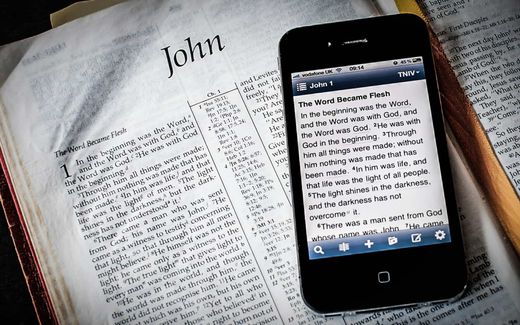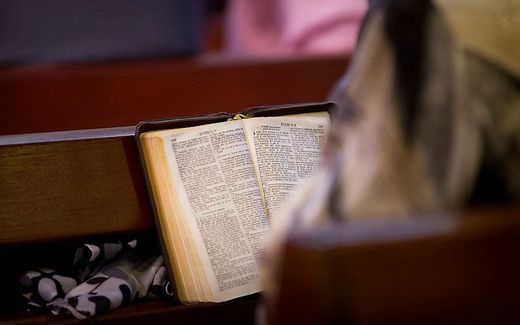Don’t give up on physical Bibles
24-05-2024
Opinion
Chris Polski, The Gospel Coalition

Physical Bibles are not old-fashioned and should be kept in honour. Photo Unsplash, Aaron Burden
Opinion
Last year, when my son went to college, I gave him one of my most precious earthly belongings —the Bible I used from the time I was in high school until I was almost 50 years old.
That Bible went through at least two rebindings, and most of its pages were creased, tattered, or coffee-stained. A few pages were even partially torn. It held almost three decades of markings and notes made from sermons, Bible studies, and personal devotions. Perhaps most interesting were the dozens and dozens of Post-it notes I stuck on the pages when I gave short devotionals or homilies. Some were over 20 years old, going back to when I was a youth minister.
I gave my son this Bible for two reasons. First, I wanted him to take a physical Bible to college. Second, I wanted him to experience, through all the visual clues, a fully used Bible — a sort of generational witness to the importance of keeping the faith.
Do Physical Bibles Still Have Value?
Recently, the elders of our church had an interesting conversation about physical Bibles. As in many churches, we’ve noticed an increasing tendency for people to use Bibles on their phones or to not bring a Bible to church at all. This is especially true for younger generations.
At first, the conversation focused on purchasing more pew Bibles so copies are easily accessible in every row of our church. But as the conversation evolved, we began to consider the unintended consequences of this — sending the signal that we don’t expect people to bring their own physical Bibles to church. Of course, we also considered the need to have Bibles for those who don’t own one or who may not be Christians.
In the end, our elders decided to provide more Bibles in the pews while also exhorting people to bring their Bibles to church. We’re grateful God’s Word is easily accessible through electronic means, and almost all of us use electronic versions of the Bible regularly. But holding a physical Bible in our laps during worship has unique benefits.
1. It creates a visual memory of Scripture texts.
After using the same Bible for decades, I can visualize where on a page a meaningful Bible passage is located. Even when I can’t remember the exact reference, I know if I scan the pages of my Bible, I’ll eventually run across that pink highlighted section with several notes on the lower left corner of the page somewhere in the Pentateuch.
2. It enables curious exploration while listening to a sermon.
Holding your Bible in your lap while a preacher expounds a text has obvious benefits for following the sermon. But it also provides opportunities for the Spirit to prompt your mind to read sections of the page that aren’t being preached on or to flip to a cross-referenced verse, creating interesting connections with the larger text.
3. It limits distractions from mobile devices.
Having a physical Bible in our hands gives us something solid to hold and drastically reduces the temptation to thumb swipe from our Bible app to email or the latest sports scores.
- It provides a durable place to write and keep notes.
The columns of our Bibles make a great space for scribbling notes or interesting insights from preachers, Bible teachers, and even our own minds as we listen to scriptural proclamation. Some Bibles are published with wide margins to accommodate note-taking.
- It signals Scripture’s value to the next generation.
In a culture that’s always looking for what’s new and next, there’s something redemptively subversive about holding open an ancient book every Sunday morning. To the younger people seated around us in our sanctuaries, this seemingly simple act sends a tangible signal of abiding value.
- It creates a spiritual keepsake for the next generation.
Regularly reading and studying the same physical Bible creates a living keepsake we can pass on to someone in our family who can carry on the work we started. Lord willing, he or she will in turn pass it along to the following generation.
Generations
I may have given my well-worn Bible to my son, but as I write, I’m looking over at a 1914 edition of the Greek New Testament with my wife’s great-grandfather’s name written on the inside cover. It contains his scribbles about the wonder of the gospel throughout. This Bible too has been thoroughly handled, with pages barely holding together and the binding failing. But its tatters bear witness that the faith we hold as a family was present generations ago, and they remind me that how we view our Bibles today can have generational consequences.
Is there enough evidence for us to believe the Gospels?
In an age of faith deconstruction and skepticism about the Bible’s authority, it’s common to hear claims that the Gospels are unreliable propaganda. And if the Gospels are shown to be historically unreliable, the whole foundation of Christianity begins to crumble.
But the Gospels are historically reliable. And the evidence for this is vast.
Chris Polski is the lead pastor of Trinity Church Kirkwood (PCA), the founder of Trinity Pastoral Succession Planning, and a visiting instructor in applied theology at Covenant Theological Seminary.
This article was published by The Gospel Coalition on March 23, 2024
Related Articles









